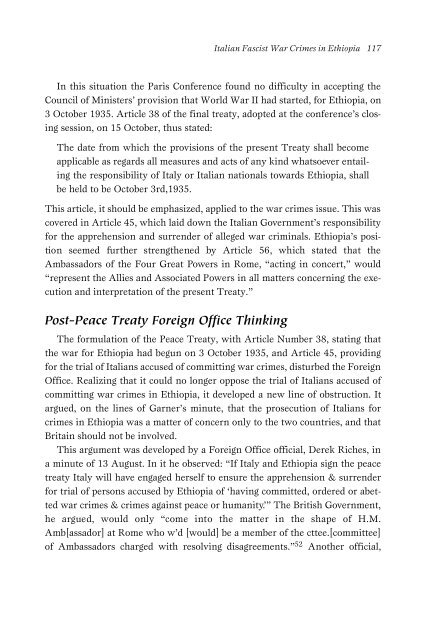Italian Fascist War Crimes in Ethiopia - Societa italiana di storia ...
Italian Fascist War Crimes in Ethiopia - Societa italiana di storia ...
Italian Fascist War Crimes in Ethiopia - Societa italiana di storia ...
You also want an ePaper? Increase the reach of your titles
YUMPU automatically turns print PDFs into web optimized ePapers that Google loves.
<strong>Italian</strong> <strong>Fascist</strong> <strong>War</strong> <strong>Crimes</strong> <strong>in</strong> <strong>Ethiopia</strong> 117<br />
In this situation the Paris Conference found no <strong>di</strong>fficulty <strong>in</strong> accept<strong>in</strong>g the<br />
Council of M<strong>in</strong>isters’ provision that World <strong>War</strong> II had started, for <strong>Ethiopia</strong>, on<br />
3 October 1935. Article 38 of the f<strong>in</strong>al treaty, adopted at the conference’s clos<strong>in</strong>g<br />
session, on 15 October, thus stated:<br />
The date from which the provisions of the present Treaty shall become<br />
applicable as regards all measures and acts of any k<strong>in</strong>d whatsoever entail<strong>in</strong>g<br />
the responsibility of Italy or <strong>Italian</strong> nationals towards <strong>Ethiopia</strong>, shall<br />
be held to be October 3rd,1935.<br />
This article, it should be emphasized, applied to the war crimes issue. This was<br />
covered <strong>in</strong> Article 45, which laid down the <strong>Italian</strong> Government’s responsibility<br />
for the apprehension and surrender of alleged war crim<strong>in</strong>als. <strong>Ethiopia</strong>’s position<br />
seemed further strengthened by Article 56, which stated that the<br />
Ambassadors of the Four Great Powers <strong>in</strong> Rome, “act<strong>in</strong>g <strong>in</strong> concert,” would<br />
“represent the Allies and Associated Powers <strong>in</strong> all matters concern<strong>in</strong>g the execution<br />
and <strong>in</strong>terpretation of the present Treaty.”<br />
Post-Peace Treaty Foreign Office Th<strong>in</strong>k<strong>in</strong>g<br />
The formulation of the Peace Treaty, with Article Number 38, stat<strong>in</strong>g that<br />
the war for <strong>Ethiopia</strong> had begun on 3 October 1935, and Article 45, provid<strong>in</strong>g<br />
for the trial of <strong>Italian</strong>s accused of committ<strong>in</strong>g war crimes, <strong>di</strong>sturbed the Foreign<br />
Office. Realiz<strong>in</strong>g that it could no longer oppose the trial of <strong>Italian</strong>s accused of<br />
committ<strong>in</strong>g war crimes <strong>in</strong> <strong>Ethiopia</strong>, it developed a new l<strong>in</strong>e of obstruction. It<br />
argued, on the l<strong>in</strong>es of Garner’s m<strong>in</strong>ute, that the prosecution of <strong>Italian</strong>s for<br />
crimes <strong>in</strong> <strong>Ethiopia</strong> was a matter of concern only to the two countries, and that<br />
Brita<strong>in</strong> should not be <strong>in</strong>volved.<br />
This argument was developed by a Foreign Office official, Derek Riches, <strong>in</strong><br />
a m<strong>in</strong>ute of 13 August. In it he observed: “If Italy and <strong>Ethiopia</strong> sign the peace<br />
treaty Italy will have engaged herself to ensure the apprehension & surrender<br />
for trial of persons accused by <strong>Ethiopia</strong> of ‘hav<strong>in</strong>g committed, ordered or abetted<br />
war crimes & crimes aga<strong>in</strong>st peace or humanity.’” The British Government,<br />
he argued, would only “come <strong>in</strong>to the matter <strong>in</strong> the shape of H.M.<br />
Amb[assador] at Rome who w’d [would] be a member of the cttee.[committee]<br />
of Ambassadors charged with resolv<strong>in</strong>g <strong>di</strong>sagreements.” 52 Another official,

















